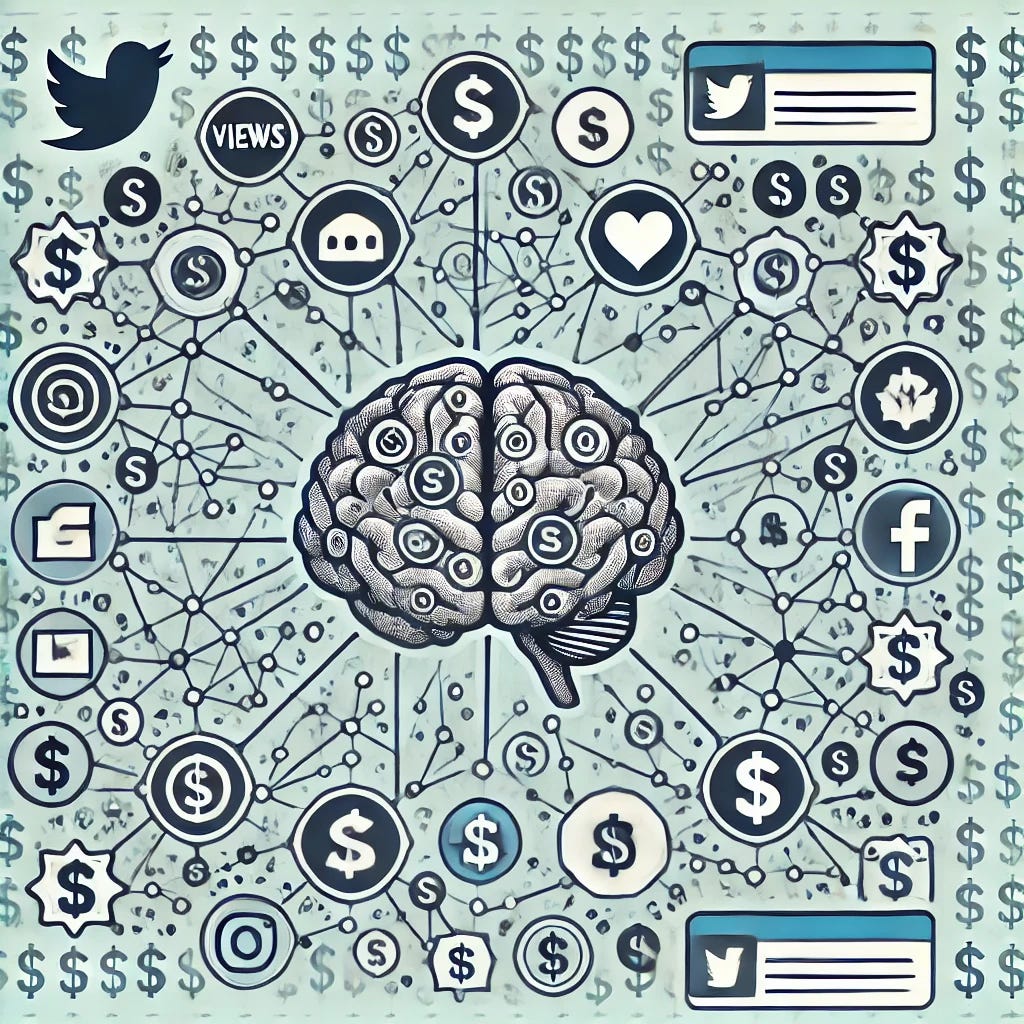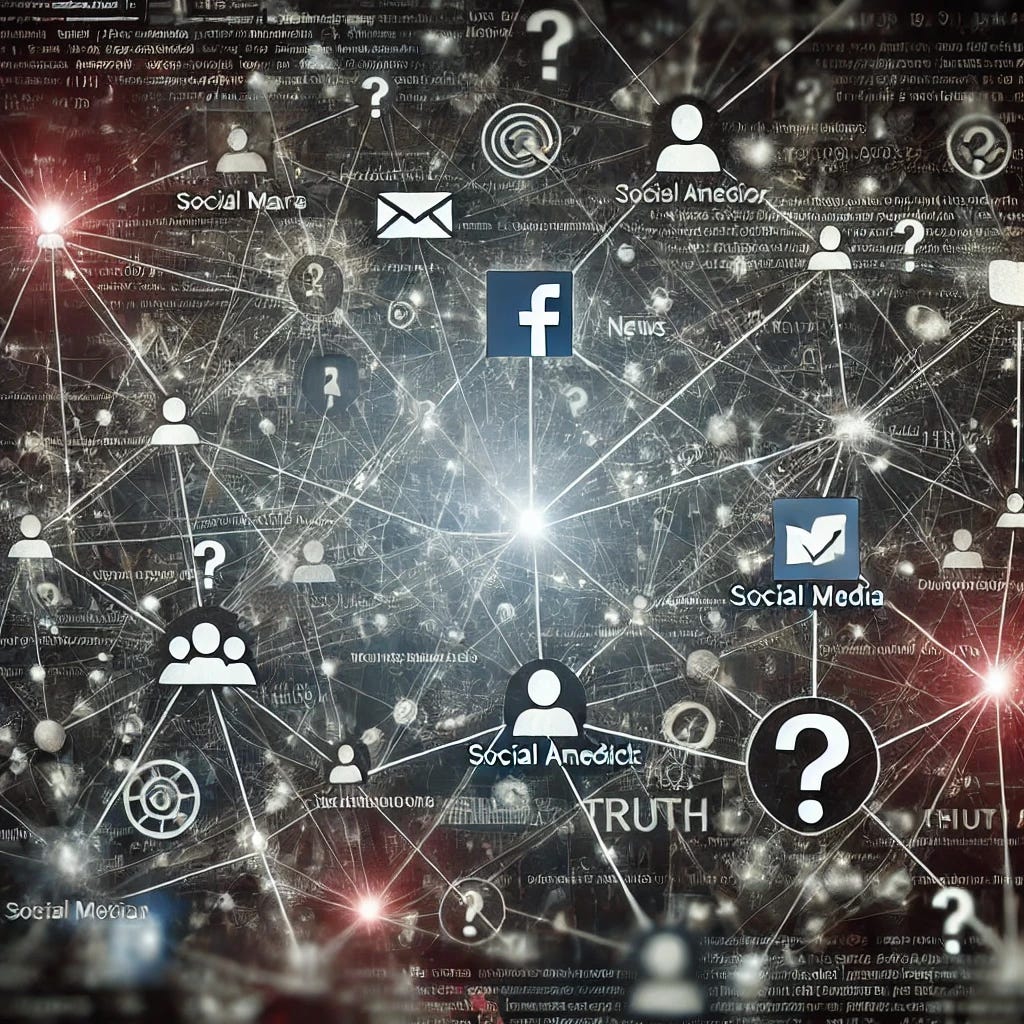“When the general population got on the Web, we saw a sea change in the diversity of online applications and content. Alongside the smartphone, we have seen a rapidly proliferating array of behaviors, content, incentives, and side effects, most of which were not squarely on our radar 50 years ago ..." remarked Vint Cerf, one of the Internet’s pioneers. No one anticipated that people would be performing skits of fake racism to gain clout on the Internet 50 years later, much less that the attention economy itself would drive such behavior. This reality underscores the profound changes and unforeseen consequences of the digital age, manifesting what the book, The Metaweb: The Next Level of the Internet, refers to as an "integral accident" of the web.
The Viral Video: A Case Study in Misinformation
In a recent reaction video, commentator Amala Ekpunobi discussed a staged racist incident in a Macy's elevator. This incident, created for clicks and engagement, sparked outrage and debates, only to be later revealed as fake. The video showed a heated confrontation between a supposed Macy's manager and an employee, culminating in a racist comment. The public's immediate reaction ranged from outrage to calls for corporate accountability. However, the entire scenario was a fabricated skit designed to manipulate emotions and garner views. Macy's had to publicly clarify that the individuals involved were actors and not affiliated with their company.
This kind of deceptive content exploits the internet’s reach, using sensationalism to capture attention. The ease with which such staged content can be presented as real, misleading viewers and damaging reputations, exemplifies a troubling aspect of our digital ecosystem.
The Attention Economy and Its Consequences
The attention economy, driven by the pursuit of views, likes, and engagement, incentivizes the creation of sensationalist and often false content. In the case of the Macy's incident, the creators of the skit exploited the public's sensitivity to racial issues, crafting a narrative designed to provoke strong emotional reactions. This strategy is not uncommon; content creators frequently fabricate events to attract attention and drive engagement, regardless of the truth or potential harm.
As Amala Ekpunobi pointed out, the fallout from such incidents includes damage to reputations, misdirected public outrage, and a general erosion of trust in genuine experiences of discrimination and racism. This undermines legitimate claims and hampers efforts to address real issues. When real acts of racism and discrimination occur, they may be met with skepticism, as the public becomes desensitized to these narratives due to previous false alarms.
Real-World Consequences of the Attention Economy
The spread of false content is not limited to isolated incidents but represents a broader trend facilitated by the mechanics of the attention economy. Social media platforms are designed to maximize user engagement by showing content that aligns with users' interests and biases. This creates echo chambers and filter bubbles where false information can spread rapidly, unchallenged by opposing viewpoints. The constant exposure to sensational and often negative content can have detrimental effects on our collective psyche, reducing our emotional well-being and fostering a culture of mistrust and cynicism.
Vint Cerf highlighted the fragility of our reliance on digital technology and the potential for misuse. He noted, "We are becoming increasingly reliant on a technology that is more fragile than we realize and we could be plunged into a 'digital dark age' that will leave us unable to access our own history." The spread of false information is one such misuse, where technology intended to connect and inform is instead used to deceive and manipulate.
The Integral Accident and Collective Emotional Well-Being
The concept of the "integral accident" from the Metaweb book describes how the complex interactions within a system can lead to unintended and often disastrous consequences.
French Philosopher Paul Virilio once said, “When you invent the ship, you also invent the shipwreck; when you invent the plane, you also invent the plane crash; and when you invent electricity, you invent electrocution ... Every technology carries its own negativity, which is invented at the same time as technical progress.” We invent the integral accident at conception. New technologies create new ways for things to go wrong.
When you invent a tool, you also invent untold uses of the tool that can speed up harm to others and exacerbate power asymmetries. It’s human nature to use tools for competitive advantage and to centralize power. Harm to others has not proven a significant deterrent.
The fake Macy's incident is an example of this phenomenon within a digital landscape driven by the attention economy. The attention economy creates incentives for sensationalism, leading to the spread of false and harmful content. This, in turn, affects our collective emotional well-being, as constant exposure to such content fosters anxiety, mistrust, and division.
As Vint Cerf observed, the early internet pioneers did not anticipate the extent to which the web would be used for malicious purposes. The consequences of this misuse are far-reaching, affecting not only individual well-being but also the fabric of society. The spread of misinformation and the erosion of trust undermine the foundations of democracy and civil discourse.
The Metaweb: A Solution Rooted in Accountability and Truth
The Metaweb, as conceptualized by Bridgit DAO, offers a solution to these challenges. It envisions a multi-layered web that goes beyond the flat, static pages we interact with today. By integrating a meta-environment above traditional web content, the Metaweb can provide real-time context, fact-checking, and a decentralized public space that prioritizes accountability and truth.
Vint Cerf’s reflections on the internet’s fragility and the need for a more resilient ecosystem are particularly pertinent. He noted, "We need some more critical thinking and willingness to think critically, especially about the information that we get." The Metaweb addresses this need by enabling users to annotate and contextualize content, fostering a collaborative effort to discern truth from falsehood. Just imagine if the internet had such tools during the Macy's prank; the truth could have been uncovered almost instantly, saving countless people from being misled.
The Metaweb’s system of real-time context and fact-checking would help users identify and flag deceptive content, reducing its spread and impact. By promoting content that is verified and contextualized, the Metaweb can counteract the negative impacts of the attention economy.
In his review of the Metaweb book, Vint noted:
I agree with the premise that accountability is an important consideration for the next iteration of the Web. While I have concerns around scalability and implementation, the notion of a meta-environment above the webpage is directionally interesting. Overall, the book presents a creative argument that warrants further discussion and exploration.
Building a Democratic Digital Future
The Metaweb’s emphasis on sovereignty, privacy, and collective intelligence aligns with the need for a new digital social contract rooted in true democracy. This contract would ensure that users have control over their data and interactions, promoting a fair value exchange and reducing the exploitation seen in today’s attention economy. By shifting from personal to collective computing, the Metaweb aims to enhance our collective cognitive capabilities, enabling us to tackle complex global challenges more effectively.
The Metaweb promotes collective intelligence and cognitive freedom, encouraging users to share verified, contextualized information. This collective effort can help discern truth from falsehood, fostering a more informed and less manipulable populace, increasing its capacity for participatory democracy.
Enhancing Cognitive Freedom
One of the most significant benefits of the Metaweb is its potential to enhance cognitive freedom. In today’s web, search engines and social media platforms often dictate what content we see, creating filter bubbles and echo chambers that limit our exposure to diverse perspectives. The Metaweb’s decentralized nature and emphasis on contextual relevance can break these silos, providing a more balanced and comprehensive view of information.
Cognitive freedom is crucial for fostering critical thinking and informed decision-making. By providing users with the tools to verify information and consider multiple perspectives, the Metaweb helps cultivate a more discerning and knowledgeable online community. This is essential for tackling the complex global challenges we face today, as well as for maintaining a healthy and functioning democracy.
Addressing the Bogus Web and False Information
The Metaweb book discusses the prevalence of scams, false information, and abuse on today's web. The fake Macy's incident exemplifies the "bogus web" where misinformation thrives due to the lack of accountability and verification. The Metaweb aims to create a more trustworthy and accountable web through features like real-time context and decentralized verification.
The book also addresses the scarcity of attention, its monetization, and the resulting polarization, false virality, and social media addiction. The staged incident aligns with these undesirable aspects, where the pursuit of attention leads to harmful consequences. By promoting content that is verified and contextualized, the Metaweb can counteract the negative impacts of the attention economy.
Real-World Implications and Future Directions
The implications of adopting Metaweb theory extend beyond addressing misinformation. By fostering a more transparent and accountable digital environment, the Metaweb can help rebuild trust in online interactions. This is particularly crucial as we move towards a future where digital and physical realities are increasingly intertwined. As Daveed Benjamin, author of the Metaweb, aptly states, this will occur when we “collectively begin to understand that we need to move from linking things to bridging them on all levels.”
In the current digital landscape, the lack of accountability and context has led to a proliferation of scams, cyberbullying, and other forms of online abuse. The Metaweb’s decentralized approach to content verification and context can help mitigate these issues. By empowering users to contribute to the verification process, the Metaweb leverages collective intelligence to create a more reliable and trustworthy web.
Moreover, the Metaweb’s focus on data sovereignty and privacy aligns with growing concerns about data exploitation and surveillance. Users regain control over their personal data, deciding how and when it is shared. This shift is essential for fostering a digital environment that respects individual privacy and promotes fair value exchange.
A Dire Conclusion
The digital landscape is fraught with challenges, from misinformation to privacy concerns. However, by embracing decentralized frameworks like the Metaweb, we can create a more accountable, truthful, and democratic internet. This shift is essential for safeguarding our digital future and ensuring that technology serves the collective good. Shiftshapr, one of the pioneers of the Metaweb Punks, a 10,080 member band that is reviving the Cypherpunk movement in the Ordinals space, said:
The Metaweb is not only viable with today’s technology but is also the absolute minimum we must achieve to enhance our collective intelligence in a world barreling towards autonomous AGI. The only barriers to the full-scale realization of the Metaweb are our own lack of imagination and foresight, along with the insidious tentacles of greed and self-centeredness that aim to dumb down the masses, whom they disparagingly refer to as the 'Dead' or the 'UnBegun.’
The Metaweb’s emphasis on real-time context, fact-checking, and decentralized verification provides a robust framework for addressing the issues highlighted by Amala Ekpunobi’s commentary and Vint Cerf’s insights. These tools aim to neutralize the trinity of separation, isolation, and exploitation that make today’s web unsafe. By promoting a culture of critical thinking, collective intelligence, and data sovereignty, the Metaweb offers a path forward that values freedom, truth, democracy, and individual sovereignty. Metaweb Punk Shiftshapr noted, “A meta-layer over the web is the only viable way to achieve an informed populace with true agency at scale.”
In conclusion, the integration of the Metaweb’s principles into our digital ecosystem can help neutralize the threats posed by the attention economy and digital deception. This is not just a technological shift but a cultural and societal one, requiring us to rethink how we interact with information and each other online. The Metaweb represents a significant step towards creating a digital environment that truly serves the interests of humanity, fostering a more informed, connected, and empowered global community.
References:
Ekpunobi, Amala. This “Racist” Elevator Encounter Went Insanely Viral. One Problem: It’s Fake.
Cerf, Vint. ‘Father of the internet’ reveals the reasons he fears for its future. Independent.
Bridgit DAO. The Metaweb: The Next Level of the Internet. CRC Press, 2024.











